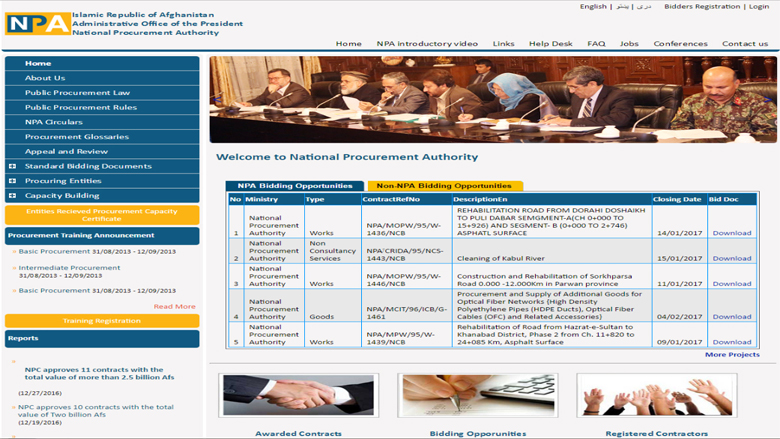KABUL CITY – The room is a little dark and every few seconds Mozhgan pulls out contracts to scan and save them on her computer’s hard drive. She saves the scanned documents using a special software and uploads them on the website of the National Procurement Authority (NPA). The scanner’s green light bounces off the floor while her colleague files other documents in a filing cabinet.
Mozhgan and her colleagues are digitizing procurement contracts to ensure transparency in the procurement system in Afghanistan. According to Transparency International, Afghanistan was the second most corrupt country in the world in 2015. However, things seem to be changing. “NPA is a very different office, we work enthusiastically to bring transparency and combat corruption,” states Mozhgan, 27, a technical officer in the archives section. “I never wanted to work with the government, but now when I see what NPA can do, I am proud to be working for the government.”
NPA developed the mechanism to digitize procurement contracts to make them accessible to the public. “We try to make it simple to access information on procurement contracts. All information is now just one click away,” says Patyal, Contracts Implementation Monitoring Director in NPA. The Authority has established a system that provides the opportunity to not only government officials but also to millions of Afghans to monitor the progress of contracts through “one click” access to contract plans and progress data. The online Contracts Progress Monitoring System captures contract implementation data from the procurement entities in a systematic way and publishes them for public and civil society monitoring.
Set up in accordance with the Procurement Law of Afghanistan, NPA is one of the most far-reaching anti-corruption measures undertaken by the Government of Afghanistan. It aims to foster institutional reform in public procurement in order to provide better services through an effective, efficient, and transparent procurement system with internationally acceptable standards and best practices.
The Authority is tasked with recommending policies, monitoring public procurement, coordinating programs, and monitoring contract implementation. It monitors projects that add as much as 19 percent to the gross domestic product and take up about half of the national budget. NPA reforms are likely to boost economic growth, introduce more effective control of financial expenditure, and, most importantly, root out corruption.
The NPA receives funding support from the Public Financial Management Reform (PFMR), a project that aims to further strengthen the efficiency and effectiveness of Afghanistan’s procurement, treasury, and audit systems. Implemented by the Ministry of Finance, the PFMR project is supported by the Afghanistan Reconstruction Trust Fund (ARTF). The project, currently in its second phase, started in August 2011 and is scheduled to operate through 2017.

